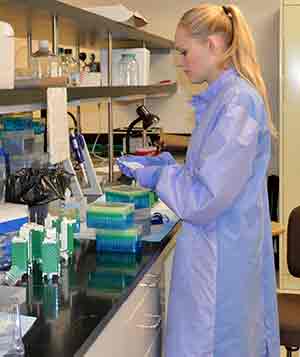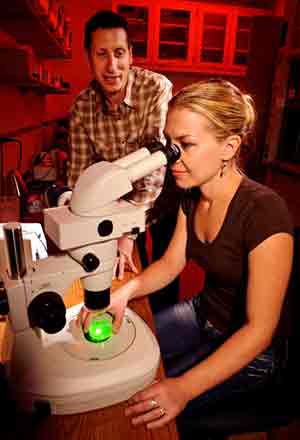
Contact Us
Institutional Communications
Bureau of Mines Building, Room 137
Laramie, WY 82071
Phone: (307) 766-2929
Email: cbaldwin@uwyo.edu
Wyoming INBRE Receives $17.2 Million NIH Grant to Continue Biomedical Research, Education
Published June 26, 2020

Samantha Haller, who started at Laramie County Community College, received an INBRE
Transition Fellowship in 2015 to attend UW and pursue her bachelor’s degree in physiology.
Haller is now in veterinary school at Washington State University. Biomedical research
and education in Wyoming will continue, thanks to a nearly $17.2 million Institutional
Development Award granted to UW’s INBRE program from the National Institute of General
Medical Sciences of the National Institutes of Health. (UW Photo)
Biomedical research and education in Wyoming will continue, thanks to a nearly $17.2 million Institutional Development Award (IDeA) granted to a University of Wyoming program from the National Institute of General Medical Sciences of the National Institutes of Health (NIH).
The Wyoming IDeA Networks of Biomedical Research Excellence (INBRE) program received a five-year grant, marking the fourth time UW has received such an award. The funding will allow Wyoming INBRE to continue to support projects that focus on health issues important to rural residents.
The total award is $17,156,980 to UW, with $15 million dedicated to the direct support of biomedical research and education at UW and Wyoming’s community colleges. The overall goal of Wyoming INBRE is to help Wyoming build its biomedical research and education infrastructure.
“The research foci for this five-year grant award are cell and molecular research, and methods for chronic disease research and therapies,” says Scott Seville, a professor in the UW Department of Zoology and Physiology, and Wyoming INBRE director and principal investigator.
The new cell and molecular biology theme builds on investments of prior INBRE awards and directly relates to the state-funded Wyoming Science Initiative, Seville says.
“It is sufficiently broad to include the majority of the most productive researchers at UW, yet specific enough to define an area of emphasis for recruiting faculty and enhancing student training,” Seville says.
The theme further enhances opportunities for INBRE to work with Science Initiative leadership on future research directions and faculty hiring, and facilitate investigator success with INBRE support, professional development and mentoring. It also opens INBRE opportunities to a larger number of community college faculty who have expertise in cell and molecular biology.
The methods for chronic disease research and therapies theme continues from the last INBRE award and builds on support to faculty -- in chemical and electrical engineering, and in molecular biology -- that resulted in the development of a bioengineering research cluster that has a central facility located in the new UW Engineering Education and Research Building that opened in January 2019.
This second theme has resulted in additional grant support for a wide range of projects focused on technological and community-based approaches, including development of microfluidic-based treatment for Type 2 diabetes and a tribal community-based project on the Wind River Indian Reservation that focused on a home gardening-based intervention to treat chronic disease in Native American communities, Seville says.
Seville says education infrastructure on which the grant will focus are:
-- Continue to provide state-of-the-art research experiences to undergraduate and graduate students at UW and Wyoming community colleges.
-- Create workshops and experiences that enhance awareness of different biomedical career trajectories, including working in academia, government, nonprofit and industry/entrepreneurship.
-- Provide education and training for faculty and students, and other Wyoming constituencies in bioinformatics. The Wyoming INBRE Bioinformatics Teaching/Research Laboratory will be located in the new Science Initiative Building.

David Fay (left), a professor in UW’s Department of Molecular Biology, works in the
lab with an INBRE undergraduate student. Fay serves as associate director of INBRE
and director of the Developmental Research Projects Program that provides research
support on a competitive basis. (UW Photo)
At UW, the program supports biomedical research faculty with project pilot grants and, each year, 20 graduate and 20-30 undergraduate student research fellows. The program also supports recruitment of new faculty; major equipment purchases, including instrumentation that will be housed in the UW Science Initiative Building; a variety of teaching and training workshops and conferences; a scientific editing service; and provides support for faculty and students to attend scientific conferences and workshops offered by other INBRE programs.
The Wyoming INBRE network includes all six Wyoming community colleges and the Gillette and Sheridan campuses of the Northern Wyoming Community College District. Each college has a faculty member serving as the project lead, and support is provided for faculty and student research experiences; faculty professional development; student research internships; laboratory equipment and supplies; trainings and workshops; and travel to scientific conferences and workshops.
Through continuing support from Wyoming INBRE, each community college now has at least one well-equipped and supplied research-dedicated laboratory for faculty to mentor students in research.
The Wyoming INBRE Bioinformatics Core provides support in state-of-the-art approaches to bioinformatics research, especially the storing, retrieving and analyzing of large amounts of biological information -- gene expression analysis, microbiome assessments and genomics -- to UW and community college faculty and students by offering consulting, workshops, courses and internships. A major goal of the new INBRE grant is to develop a bioinformatics research and training center in the UW Science Initiative Building slated to open this winter.
Support also is provided to community college students pursuing degrees in biomedical-related disciplines who transfer to UW. A key goal of the network is to enhance the exchange of research expertise and infrastructure between UW and community colleges.
Wyoming, with UW as the lead institution, is one of 23 states and Puerto Rico funded by the NIH INBRE program. The INBRE program supports a statewide biomedical research development network in each IDeA-eligible state that partners research-intensive institutions with primarily undergraduate institutions, including community colleges.
After an initial three-year Biomedical Research Infrastructure Network grant in the early 1990s, UW received its first INBRE award, totaling $13 million, in 2004. The university received a $16.9 million award to fund INBRE 2 in 2009 and $17.4 million in 2015 to fund INBRE 3. The four INBRE awards to UW total nearly $64.5 million. The INBRE program is beginning its 19th year.
This most recent grant began May 1 and will expire April 30, 2025.
David Fay, a professor in the UW Department of Molecular Biology, serves as associate director of INBRE and director of the Developmental Research Projects Program that provides research support on a competitive basis. Naomi Ward, a UW professor and head of the Department of Botany, is director of the Bioinformatics Core, and Nic Blouin, a senior research scientist in molecular biology, is the associate director.
Contact Us
Institutional Communications
Bureau of Mines Building, Room 137
Laramie, WY 82071
Phone: (307) 766-2929
Email: cbaldwin@uwyo.edu
